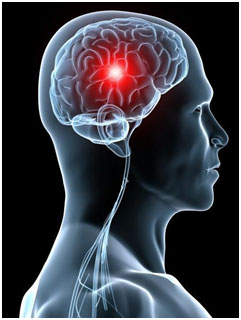Cardio-vascular illnesses
Cerebral vascular accident
 The brain stroke corresponds to a brutal stoppage of blood circulation to the brain.
The brain stroke corresponds to a brutal stoppage of blood circulation to the brain.
The CVA happen most of the time because of a clot in the artery or an intra-cerebral haemorrhage, which is a rupture of the walls of the vessel.
Between 140 000 and 150 000 persons are victims of a cerebral vascular accident every year in France, and women are more often affected than men
CVA is the first reason for an adult of becoming handicapped,
It is the second cause of dementia after Allzheimer’s disease
It is the third one for death in France.
What is a cerebral vascular accident ?
A cerebral vascular accident or CVA, commonly known ads “brain-stroke” is a sudden loss of the brain to function.
There are two types of a cerebral vascular accidents :
The ischemic CVA
In eight cases out of ten the CVAs are ischemic CVAs: interruption of blood circulation because of a clot (coagulated blood), blocking an artery going to the brain.
Its main reason for happening is the atherosclerosis: namely an accumulation of cholesterol deposits onto the walls of the arteries. Sometimes its origin comes from a clot of blood remote from the brain, for example in the heart. This clot is then transported by the blood to the brain.
The haemorrhagic strokes
They are the rarest cases. The stoppage of blood circulation comes from a rupture of an artery of the brain. The principal reason for a CVA is arterial tension.
Which are the risk factors for a CVA ?
- Age : More than half of the CVA happens among the people of 75 years old or older, against 1/4th for those under 65.
- Some hearty diseases (anomaly of the cardiac valve, insufficiency or arrhythmia), needing a lifelong treatment with anticoagulants
- Arterial hypertension, which is major risk
- Hypercholesterolemia
- An earlier cerebral vascular accident or an TIA. The transitory ischemic accident is indicating that the risk for getting a CVA is big.
- Diabetes
- Tobacco consumption: stopping to smoke halves the risk for a brain stroke
- Alcohol consumption, because it influences also arterial pressure
- Being too sedentary
Which are the symptoms of a CVA ?
- Dizziness
- Vertigo and disequilibrium
- Troubles of sight and difficulty in speaking and in comprehension
- Violent head aches, accompanied by nausea and vomiting, brutally happening
Another manifestation : Sudden paralyse of a leg, the face, part of the body. You have to know that there is no tight correlation between Hemiplegia and the extension of a CVA.
Which are the treatments of CVA ?
It is of major importance to urgently be taken care of in a neuro-vascular medical unit.
Call the emergency number.



